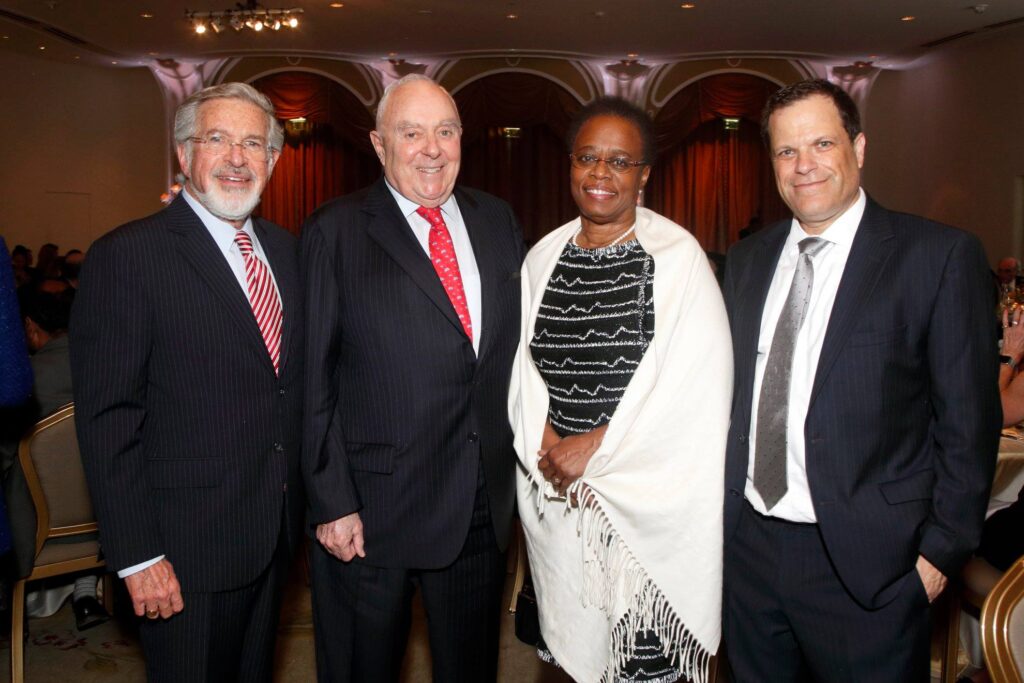“Anniversaries are a time to reflect, as well as a time to look forward,” Leonard Schaeffer told the crowd at the celebration of the 10th anniversary of the USC Leonard D. Schaeffer Center for Health Policy & Economics.
In its first decade, the Schaeffer Center has positioned itself as a national leader in finding solutions that help drive decisions to advance delivery of care, foster innovation, enhance healthcare markets, and improve the health outcomes of an aging population.

“The Schaeffer Center may be only ten years old but it is a towering adult in the world of health policy already,” keynote speaker Joseph A. Califano, Jr, told the crowd of over 300 supporters, faculty, staff and friends at the Center’s anniversary celebration in February.
From defining value in cancer treatments to predicting the impact of changes in demographics, to enhancing Medicare, work by Schaeffer Center researchers and staff has informed lawmakers, media and private sector leaders, making a real impact on improving the health of individuals.
A Vision for an Academic Center Grounded in Evidence-Based Research and Impacting Health Policy
Ten years ago, Leonard Schaeffer shared his vision with USC leadership: he envisioned an academic center that was grounded in the rigorous, evidence-based research of a university, but would move beyond the university to inform health policy.
It was decades earlier, during the early stages of his own career spanning influential public and private roles, that Schaeffer’s understanding of the importance of decision making grounded in evidence-based research came to the fore at the national level.
Califano, Secretary of Health, Education and Welfare (now the Department of Health and Human Services) in President Jimmy Carter’s administration, had selected Schaeffer as the Administrator of the Federal Health Care Financing Administration (now the Centers for Medicare & Medicaid Services). In that position, Schaeffer refocused federal grants to fund applied research that would improve the effectiveness of the programs he was tasked to run.
As Califano told the story of Schaeffer’s early career he noted, “No one was better or more committed than Leonard to providing healthcare to those who needed it and it is my pleasure to know [him].”
The Schaeffer Center Launched Amidst National Debate on Health Care Reform, Drug Pricing
Led by Schaeffer Center Director Dana Goldman, the Center is a collaboration between the USC Sol Price School of Public Policy and the USC School of Pharmacy, making it the first health policy research center to combine the interdisciplinary strengths of pharmacoeconomics and public policy analysis.
In 2009 the nation was grappling with how to implement federal health care reform and issues of drug pricing were becoming more prominent. Flash forward to 2017, through its partnership with the Brookings Institution, Center experts provided the first analysis of repeal-and-replace bills, before the Congressional Budget Office could finish its own analyses.
As specialty drugs have hit the market, including a cure for hepatitis C, Schaeffer researchers have proposed innovative strategies to prioritize access to those lifesaving drugs while recognizing the importance of appropriating incentivizing innovation. Louisiana, for example, is implementing a plan this year to connect Medicaid recipients with the lifesaving treatment.
“The work [the USC Schaeffer Center] does today, is going to help make a better world tomorrow,” said USC Interim President Wanda Austin at the event, who also called the Center “one of USC’s crown jewels.”
Research findings from the USC Schaeffer Center have informed the decisions of government and business leaders and earned citations in dozens of federal reports, from the White House to the Centers for Disease Control and Prevention. Center experts are regularly contacted by the media to comment on healthcare policy and other economic challenges. The Center has also convened hundreds of events on pressing issues like Medicare drug pricing and trends in insurance premiums.
Looking Ahead
Both Schaeffer and Goldman are confident that over the next 10 years, the Center will continue to inform decision-makers on how to address the most pressing healthcare issues.
“In healthcare, change is the only constant. For the Center, however, change is not a problem,” Schaeffer said at the end of his remarks. “The Center is well equipped to tackle new questions with energy, innovation and intellectual rigor.”
The USC Schaeffer Center has grown from its initial 4 faculty members to over 100 faculty and staff, including three Nobel Prize winners. In 2016 it launched a formal partnership with Brookings—the USC-Brookings Schaeffer Initiative for Health Policy. And Goldman has no plans of slowing down.
“Thanks for celebrating with us this evening,” Goldman said. “And we look forward to you joining us again when we celebrate our twentieth anniversary.”





You must be logged in to post a comment.